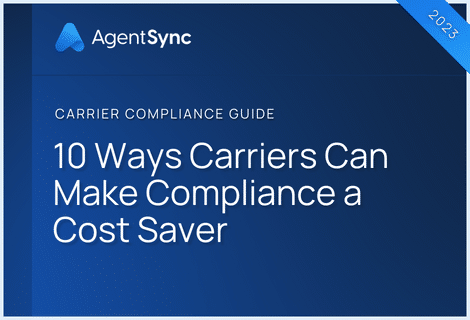

You’re unique, unrepeatable, singular. … and so are your fingerprints. That’s what makes “dermatoglyphs” so handy in recognizing individuals, because no two of us are the same. Scientists hypothesize waves of amniotic fluid influence the whorls and patterns of your fingers as you grow in utero, as well as potential genetic factors.
While the study of fingerprints is fascinating and mysterious, we must turn to a more banal application of fingerprint knowledge: state use of fingerprinting in insurance licensing for producers and adjusters.
Similar to fingerprints, no two states do things exactly alike when it comes to anything in insurance, and fingerprinting is no different. Instead, we’ll explore some of the variations and broad themes of where your digits might fit into applying for an insurance license.
Fingerprinting: Your resident state licensing application
Getting an initial insurance license comes with many hoops to jump through, from prelicensing to examination, from citizenship affidavits to background checks.
The majority of states require applicants for resident producer and adjuster insurance licenses to get fingerprinted as part of the process. How a state receives those prints varies, and most states have a vendor of some kind that takes prints and processes them on that state’s behalf. The process may look like:
- The state has a fingerprint vendor and you must drive to a physical location to have your fingerprints taken onsite.
- The state or their vendor takes fingerprints onsite at the exam location and processes your fingerprints once they’ve confirmed you passed the exam.
- The state has local law enforcement conduct fingerprinting and you, the applicant, must submit fingerprints with your application.
In states where the fingerprint vendor has few physical locations, an applicant may get an exception to have local law enforcement take prints and seal them so the applicant can mail them to the vendor. This is why many states have “expiration dates” for fingerprints, where an applicant can hold onto a sealed envelope of their fingerprint card for 30 or even 90 days to finish the other pieces of their application.
Background checks
Most states require fingerprinting, but several states also require a background check. And three states – Arkansas, Iowa, and Kentucky – don’t require applicants to get fingerprints taken, but still run a general background check. Other states, like California, specify that the fingerprints they take from licensing applicants will be used to run background checks.
States generally fall into three levels of depth for background checks, from the most basic to the deepest:
- A general background check doesn’t necessarily require fingerprinting and will return information like driving records, credit history, and other fairly public information.
- A criminal background check will use fingerprints to scan relevant criminal databases and law enforcement records.
- An FBI background check will be the most in-depth of the possible searches, using fingerprints to search federal records and may even return expunged records.
This is why it’s so critical to be transparent and honest in your license application – if the record retrieval might return something unflattering, you have a better shot at getting your license approved if you’ve already disclosed this information.
Do I need to get fingerprinted for nonresident state insurance licensing applications?
Thanks to resident license reciprocity agreements between the states, you almost never need to get fingerprinted in order to get a nonresident state added to your existing insurance license. ALMOST.
Florida and California, however, require all applicants, even applicants who have reciprocal licenses, to submit fingerprints to their state to be licensed. California will then run an FBI-level background check on applicants, again, regardless of where they’re from.
What to do if I have a checkered past but dream of being an insurance producer or adjuster?
Start by having a conversation with the regulatory body governing your state’s insurance industry. Your state’s department of insurance has loads of experience navigating insurance applications. An administrator who has seen a million examples of what will or won’t fly on an application can give you a roadmap of what to look out for and how to handle a troubled past.
Would-be applicants can get wary, thinking their questions may be too revealing and count against them in some way. Yet, instead, this is an opportunity to get information about how you can contextualize your existing past for a bright future.
As we’ve heard from insurance regulators over and over again, they would prefer you reveal too much and self-report more data than what shows up on a criminal background screening as opposed to revealing too little and having a background check air your history. Yet, in the interest of covering everyone’s backsides, if you have some past shenanigans, it never hurts to enlist a lawyer who can help you map your way through an insurance application.
Insurance carrier background checks and fingerprinting
Just because your resident state doesn’t require a background check or fingerprinting doesn’t mean you should skirt the gray areas of an application. Insurance carriers or agencies may require a background check to fulfill their due diligence requirements before they appoint or affiliate individuals.
Like state governments, carriers and agencies may enlist third-party services to run background checks or even take fingerprints. Insurance is a business built and maintained on a premise of trust, and keeping that in mind can go a long way toward making sure you stay on the right side of compliance.
Insurance carriers and agencies have a challenge maintaining that high bar of due diligence and protecting consumers’ trust, but fortunately they can use products like AgentSync Manage to keep their adjusters and producers in compliance. By partnering with specific background check providers, Manage provides a streamlined and simplified producer experience while reducing administrative costs and churn for your internal team. Instead of waiting weeks to email or fax paperwork back and forth, carriers and agencies that use Manage and its robust integrations can onboard adjusters and producers in days.
Check out more about how Manage can remove the cumbersome processes of producer management from your organization and get a demo today.
Or, to learn more about how your specific state handles fingerprinting, check out the licensing section of your state in the AgentSync Compliance Library.

